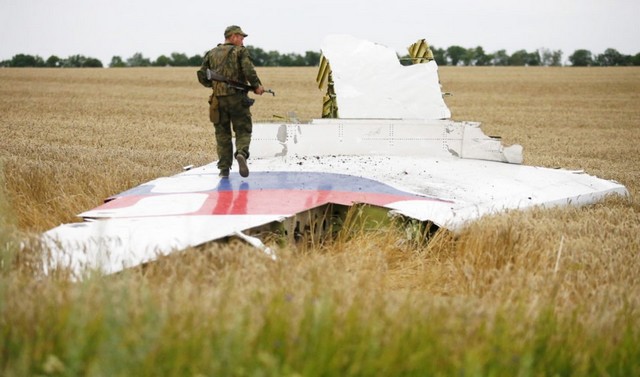By Kees van der Pijl
On 9 March, 2020, the trial of those accused of being responsible for the downing of Malaysia Airlines Flight MH17 on 17 July 2014, is planned to begin. The decision to hold a trial of MH17 suspects was taken by the Dutch Public Prosecution Service (Openbaar Ministerie, OM) on 19 June 2019, on the basis of the criminal investigation by the Joint investigation Committee, JIT. The JIT members conducting this investigation are the Netherlands, Australia, Belgium, and Ukraine and Malaysia (since March 2015). Prime Minister Mahathir of Malaysia has criticised the late admission of his country to the criminal prosecution, and also has raised doubts about the pertinence of the indictment for murder of three Russians and one Ukrainian, an indictment made public at the JIT press conference also on 19 June 2019.
Whether the JIT under these circumstances is still able to function, is therefore in serious doubt. The decision by the JIT countries that the prosecution and trial of suspects would be conducted by and in the Netherlands, under Dutch law, dates from 5 July 2017. To facilitate the actual trial next year, a special treaty was concluded by the Netherlands and Ukraine covering a number of practical issues such as extradition, video hearing of defendants, and the like. The trial will be held before the Hague District Court, in a special location to accommodate a large trial, the Justice Complex Schiphol (JCS) near Schiphol Airport. On the special website launched to publicise the event, and via which its proceedings will be live-streamed, the court is already being recommended as having extensive experience with cases involving international elements. ‘It has, for instance, heard cases with regard to offences that nowadays are punishable in the International Crimes Act. Examples of offences under this law are genocide, crimes against humanity, war crimes and torture.’ As the website continues,
The quality of the Dutch justice system ranks above average compared with other countries. This is confirmed by the EU Justice Scoreboard (a comparison of the justice systems of the European Union member states) and the Rule of Law Index (a global comparison of justice systems). These rankings are based on matters such as the average duration of trials, how judges are trained and the extent to which the justice system is free from discrimination, corruption and political influence. In terms of experience with international proceedings, the Netherlands ranks number one in the world.
These self-congratulatory qualifications notwithstanding, we cannot look forward to the trial with confidence, on the contrary. For the sort of justice being dispensed here is a very special, new form of justice, international criminal law. That type of law is not the familiar form of international law, based on treaties, of which states are the legal subjects. It is an individualised form of transnational penal law, national to varying degrees (hence, ‘involving international elements’), and with a record that does not give rise to optimism, certainly not where it concerns he role of the Netherlands.
In one of the most disturbing cases, the International Criminal Tribunal for the Former Yugoslavia (ICTY), which also sat in The Hague, the prosecution was principally directed against Serbians and the chief suspect, Yugoslav president Slobodan Milošević, died in his cell after the main charge against him had been dropped for lack of evidence. On the other hand, NATO bombing of Serbia, without even a UN mandate, was not prosecuted and the secessionists’ actions in the violent dissolution of Yugoslavia profited from a light touch. Since one of the judges assigned to the MH17 trial, Ms. C.I.H. Kerstens-Fockens LLM, was an intern at the ICTY, the Yugoslavia experience deserves to be investigated closely. In the parallel Rwanda tribunal, only Hutus were investigated and indicted for the massacres in 1994, whilst the Tutsi RPF, which triggered the bloodbath by shooting down the plane of the Rwandan president, was not. The International Criminal Court (ICC) only indicted Africans, whilst George W. Bush and Tony Blair, who ordered the invasion of Iraq, were seemingly above the law. In the Lockerbie trial held in the Netherlands (by a Scottish court), a Libyan who had nothing to do with that disaster was found guilty and sentenced. So if in the upcoming MH17 trial, only Russians and pro-Russian Ukrainians are the suspects, this fits the longer trend.
One must fear, then, that the upcoming trial of the MH17 suspects will not depart from the pattern established in the three decades of legal precedent in this area. Indeed, prosecution in international criminal cases has so far turned out to be nothing else but the continuation by different means of so-called ‘humanitarian intervention’; so first comes the intervention itself (sanctions, ‘colour revolutions’, coups d’état, regime change wars), and then the judicial sequel, all part of a single punitive operation. Indeed ‘humanitarian intervention’, harking back to the mediaeval concept of ‘just war’, in all or most cases has been followed by the application of criminal justice to the parties against whom the intervention was launched in the first place. This is the one similarity with the trials of Nazi and Japanese war criminals at the end of World War II, except that the Nuremberg trial of the former laid down the principle that launching a war is the supreme war crime. Humanitarian intervention has functioned as a way round that principle.
Kees van der Pijl is a Dutch political scientist who was professor of international relations at the University of Sussex. He is known for his critical approach to global political economy and has published, amongst others, Flight MH17, Ukraine and the New Cold War.
25 November 2019

